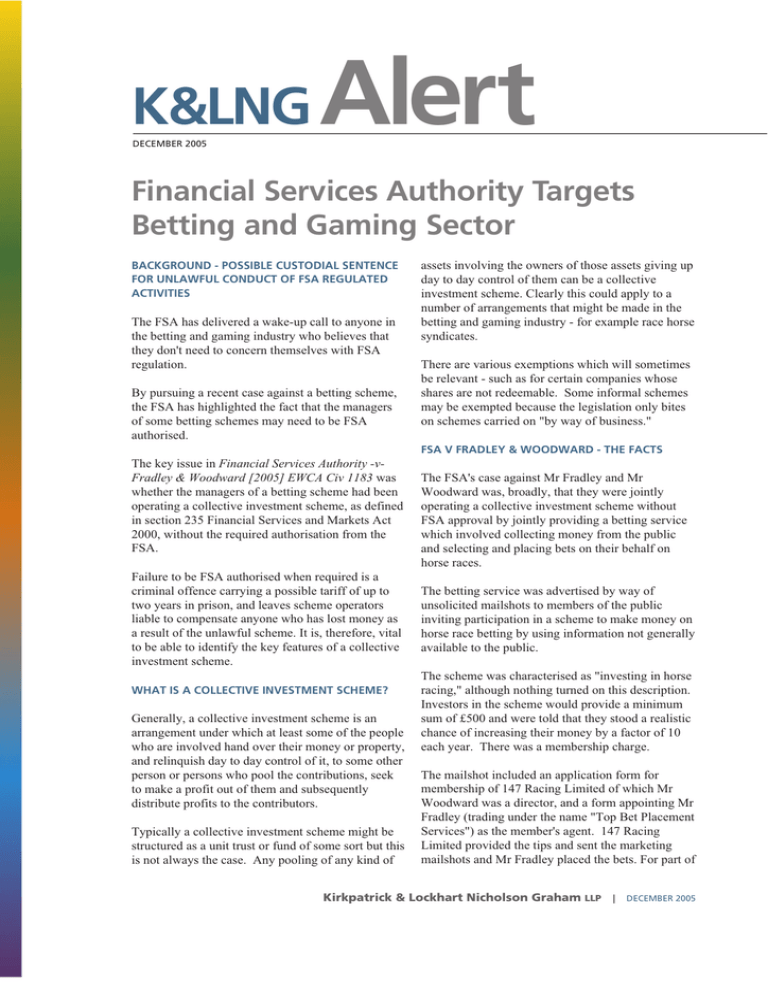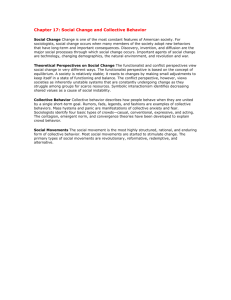
K&LNG
DECEMBER 2005
Alert
Financial Services Authority Targets
Betting and Gaming Sector
BACKGROUND - POSSIBLE CUSTODIAL SENTENCE
FOR UNLAWFUL CONDUCT OF FSA REGULATED
ACTIVITIES
The FSA has delivered a wake-up call to anyone in
the betting and gaming industry who believes that
they don't need to concern themselves with FSA
regulation.
By pursuing a recent case against a betting scheme,
the FSA has highlighted the fact that the managers
of some betting schemes may need to be FSA
authorised.
assets involving the owners of those assets giving up
day to day control of them can be a collective
investment scheme. Clearly this could apply to a
number of arrangements that might be made in the
betting and gaming industry - for example race horse
syndicates.
There are various exemptions which will sometimes
be relevant - such as for certain companies whose
shares are not redeemable. Some informal schemes
may be exempted because the legislation only bites
on schemes carried on "by way of business."
FSA V FRADLEY & WOODWARD - THE FACTS
The key issue in Financial Services Authority -vFradley & Woodward [2005] EWCA Civ 1183 was
whether the managers of a betting scheme had been
operating a collective investment scheme, as defined
in section 235 Financial Services and Markets Act
2000, without the required authorisation from the
FSA.
Failure to be FSA authorised when required is a
criminal offence carrying a possible tariff of up to
two years in prison, and leaves scheme operators
liable to compensate anyone who has lost money as
a result of the unlawful scheme. It is, therefore, vital
to be able to identify the key features of a collective
investment scheme.
WHAT IS A COLLECTIVE INVESTMENT SCHEME?
Generally, a collective investment scheme is an
arrangement under which at least some of the people
who are involved hand over their money or property,
and relinquish day to day control of it, to some other
person or persons who pool the contributions, seek
to make a profit out of them and subsequently
distribute profits to the contributors.
Typically a collective investment scheme might be
structured as a unit trust or fund of some sort but this
is not always the case. Any pooling of any kind of
The FSA's case against Mr Fradley and Mr
Woodward was, broadly, that they were jointly
operating a collective investment scheme without
FSA approval by jointly providing a betting service
which involved collecting money from the public
and selecting and placing bets on their behalf on
horse races.
The betting service was advertised by way of
unsolicited mailshots to members of the public
inviting participation in a scheme to make money on
horse race betting by using information not generally
available to the public.
The scheme was characterised as "investing in horse
racing," although nothing turned on this description.
Investors in the scheme would provide a minimum
sum of £500 and were told that they stood a realistic
chance of increasing their money by a factor of 10
each year. There was a membership charge.
The mailshot included an application form for
membership of 147 Racing Limited of which Mr
Woodward was a director, and a form appointing Mr
Fradley (trading under the name "Top Bet Placement
Services") as the member's agent. 147 Racing
Limited provided the tips and sent the marketing
mailshots and Mr Fradley placed the bets. For part of
Kirkpatrick & Lockhart Nicholson Graham LLP |
DECEMBER 2005
the time during which this scheme operated,
"investors" were offered an automated service under
which use of Mr Fradley's services by 147 Racing
Limited on behalf of members was mandatory.
If the case does in fact go to a full trial we will
report in a further alert on the final judgement.
CAUTIONARY TALE - NEXT STEPS
THE JUDGEMENT - KEY POINTS
The case was most recently taken to the Court of
Appeal as an appeal against a summary judgement
by the first instance judge to the effect that there
were periods during which the betting scheme had
been an unlawful collective investment scheme.
The Court of Appeal's principal task was to
determine whether the case could go to full trial on
the grounds that Mr Fradley had some chance of
showing that there was no collective investment
scheme. There was no re-examination of the facts
by the Court of Appeal which decided (in Mr
Fradley's favour) that there was a triable issue as to
whether there was a collective investment scheme ie Mr Fradley had some chance of success at trial.
It was clear from the Court of Appeal's judgement,
however, that, depending on the precise nature of
the arrangements between Mr Fradley and Mr
Woodward, the betting scheme could well have
been a collective investment scheme. The Court
made the following interesting observations on
collective investment schemes:
The "arrangements" which make up a collective
investment scheme do not necessarily require
any formality or need to be legally binding.
The property of a collective investment scheme
can comprise just money - ie there is no
necessity for it to be invested in anything.
A single collective investment scheme can have
two or more operators.
The operators of a single collective investment
scheme can be independent entities.
Not all of the customers of the scheme need to
have relinquished day to day control of their
money for the scheme as a whole to be
characterised as a collective investment scheme.
2
Those in the betting and gaming industries should
clearly take careful note of this case. Any pooling
of customer assets and use of those assets on
customers' behalf should set alarm bells ringing.
Anyone who organises arrangements which may
have these characteristics should be particularly
wary as to how their services are being sold: Mr
Fradley's troubles were exacerbated by the
marketing of his services as a single "scheme" with
the services of 147 Racing Limited.
In addition to collective investment scheme issues,
arrangements such as joint ownership of race horses
can also raise other securities law concerns: for
example marketing to encourage people to join
schemes of this kind may need to be approved by an
FSA authorised firm, and syndicates organised as,
for example, private companies will need to avoid
unlawful public offers of their securities.
If you have any doubts at all come and speak to our
financial services and betting and gaming lawyers as
the FSA is clearly looking very carefully at suspect
arrangements in the betting and gaming industry.
Kirkpatrick & Lockhart Nicholson Graham
LLP
|
DECEMBER 2005
If you have questions or would like more information about K&LNG’s Betting & Gaming or our Finanical
Services practices, please contact one of our lawyers listed below:
LONDON
Philip Morgan
Warren Phelops
+44 (0)20 7360 88123
+44 (0)20 7360 8129
pmorgan@klng.com
wphelops@klng.com
www.klng.com
BOSTON • DALLAS • HARRISBURG • LONDON • LOS ANGELES • MIAMI • NEWARK • NEW YORK • PALO ALTO • PITTSBURGH • SAN FRANCISCO • WASHINGTON
Kirkpatrick & Lockhart Nicholson Graham (K&LNG) has approximately 1,000 lawyers and represents entrepreneurs, growth and middle market companies, capital
markets participants, and leading FORTUNE 100 and FTSE 100 global corporations nationally and internationally.
K&LNG is a combination of two limited liability partnerships, each named Kirkpatrick & Lockhart Nicholson Graham LLP, one qualified in Delaware, U.S.A. and
practicing from offices in Boston, Dallas, Harrisburg, Los Angeles, Miami, Newark, New York, Palo Alto, Pittsburgh, San Francisco and Washington and one
incorporated in England practicing from the London office.
This publication/newsletter is for informational purposes and does not contain or convey legal advice. The information herein should not be used or relied upon in
regard to any particular facts or circumstances without first consulting a lawyer.
Data Protection Act 1988—We may contact you from time to time with information on Kirkpatrick & Lockhart Nicholson Graham LLP seminars and with our regular
newsletters, which may be of interest to you. We will not provide your details to any third parties. Please e-mail cgregory@klng.com if you would prefer not to
receive this information.
© 2005 KIRKPATRICK & LOCKHART NICHOLSON GRAHAM LLP. ALL RIGHTS RESERVED.
3
Kirkpatrick & Lockhart Nicholson Graham
LLP
|
DECEMBER 2005




